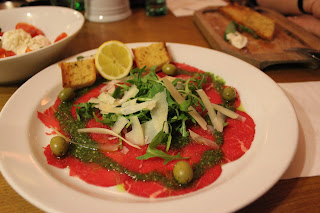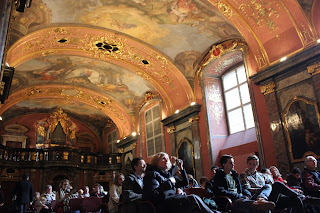I just came back from a four-day trip to Prague with two of my colleagues, Johan and Christina, and 26 of my students (class SP10D). We had a fantastic stay, everyone had fun, and we were all a happy sort of exhausted on the long bus ride back. I’d been to Prague once before, in February, and vowed I’d come back, but in the spring. So that’s what I did, but of course spring was a month delayed, as in most of Europe, so I have to go back one more time. Darn.

Prague is so beautiful, it’s almost too beautiful. You can’t do much more than walk around, wish you could absorb it all and wonder why Kafka was so freaking depressed. (It took me forever to get through The Trial and upon completion I vowed never to read another of his books again, but Johan (Swedish teacher and literature extraordinaire) advised me to read it as a work of ironic humor. So maybe that's what I’ll do when I retire.) I suppose too much beauty could cause depression though. It desensitizes you if you live in it too long.
The hostel. Prague Square Hostel (http://www.praguesquarehostel.com/). Austere in terms of amenities and breakfast, but superb in its location, just a block up from the Astronomical Clock. Much taller than it is wide, you’ll get a workout climbing the stairs several times a day. But you’ll need it, because Czech food is very heavy.
As in all hostels, one meets a fascinating variety of people. Among others, there were three American ex-pats working the reception desk. Curiously, I’m always surprised to meet Americans who live and work overseas, forgetting that I’m an American living and working overseas.
The food. I’m all about meat and potatoes, but the Czechs take it to a whole other level of heavy. The typical dish is goulash and dumplings (potatoes and flour). Super yum, but it will constipate you if you eat too much of it. Luckily there are lots of other types of cuisine available, Italian being the most prevalent.
We (Johan, Christina and I) went to a restaurant called
Pasta Fresca! (
http://pastafresca.ambi.cz/en/#index) that Christina had discovered on a previous visit, and boy was it fresca. The pasta is made from scratch
in situ and we never had to wait more than 15 minutes for the food to arrive. Everything we ate was superbly done. All three of us loved it so much that we went back twice, the third time with the whole class.
I want to revisit Prague just to eat there again. I’m in love with everything about it: the design, the food, the service, even the restrooms were delightful. Located a block up from the Old Town square, it’s very easy to miss. The entrance is a really narrow hallway and to get to the restaurant level you must go down three flights of stairs into the cellar. The design is modern, warm and sophisticated - I want my dining room to look exactly like it (someday, if/when I have a house).
Another place we discovered was
Architects' Club (http://www.lunchtime.cz/klub-architektu/english/#obecne). You’ll get traditional Czech cuisine here, and it’s really really good. This is also one where you need to take the stairs down to the cellar. Very sophisticated and elegant in its design, and like I said, the food was fantastic. I ate the best goulash and dumplings I’ve ever tasted.
My colleague Christina is a fanatic of Wienerschnitzel. Everywhere we go, she must find a restaurant where they serve this. Happily, she was recommended a restaurant called
Kolkovna (
http://www.kolkovna.cz/index.php?language=en) that reportedly served the best schnitzel in the city. It is also recommended by the Michelin guide for serving superb local Czech cuisine. How could we resist?
The place is reminiscent of a London pub and it was completely full - always a good sign. The three of us decided to go all out and order three courses. As an appetizer, Johan and I shared a Caprese with mozzarella made from buffalo milk and a Carpaccio. Probably the best I’ve ever tasted.
Then we both ordered sausage as a main dish. I’m not much of a sausage person, but I figure while in the Czech Republic, eat as the Czechs, so I hunkered down and ate three very tasty sausages. Amazing food, but I will not be eating sausage again for a while. It was borderline to being too much (and I can EAT!).
Despite being full, I ordered Bavarian Cream with fruit for dessert, and it was amazing.
Christina of course had the Wienerschnitzel and was in heaven for the rest of the evening.
The sights. It’s not easy avoiding the tourists traps, but I think we did well overall, with one exception.
 The Astronomical Clock is beautiful and ancient (built in 1410). People will flock and wait to see the thing chime on the hour. Not much happens (the 12 apostles peep through two windows that open), but I guess it’s something one should see when here, just because. The clock tower is a must. You get an amazing view of Prague from the air and the climb up the tower will give you some nice exercise. :)
The Astronomical Clock is beautiful and ancient (built in 1410). People will flock and wait to see the thing chime on the hour. Not much happens (the 12 apostles peep through two windows that open), but I guess it’s something one should see when here, just because. The clock tower is a must. You get an amazing view of Prague from the air and the climb up the tower will give you some nice exercise. :)
The city is known for its art and music and a concert by string quartet is a must. There is a ticket office in the Old Town Square cathedral that specializes in classical and jazz concerts. You can also buy tickets to an array of other performances as well, but be careful. Johan and I and two students went to see highlights from the Swan Lake ballet and it was a serious disappointment. Two of the three male dancers were definitely past their prime (and left me wondering if they’d ever even had a prime) and the rest of the dancers weren’t much better. The choreography was lame, the theatre uninspiring, and the music came via speaker, not via live orchestra. Total disappointment. However, to be fair, the girl who danced the main role of Swan princess was fantastic. Definitely in another league from the others. I wonder how all of the backstage politics played out there....

In my opinion, the Church of Our Lady of Týn is the most beautiful cathedral in existence. I love gothic architecture and I think it looks so mysterious and haunting. During my first visit to Prague, my mother and I went to an evening mass there and I remember thinking that this must be the most beautiful interior I’ve ever seen. Everything was in black and gold; even the stone walls were black. This time I went back and to my disappointment, the whole interior was white (the black and gold fixtures were still there, but the walls had been whitewashed). Or maybe they’d always been whitewashed and it’s just my memory playing a prank, but still.
Klementinum, a complex of concert halls, is where we took the whole class to see a classical music performance. A string quartet with organ played famous pieces by Vivaldi, Bach, Mozart, Dvorak and Smetana. The music was beautiful and the venue equally so.
You can’t be in Prague and not cross the famous
Charles Bridge to the other side called
Malá Strana. This is where all of the embassies are located as well as
Prague Castle. Johan and I took the students up to the castle complex mostly because we wanted to hear them complain about having to climb all the stairs (I jest). It’s hard not to be impressed by the towering Saint Vitus Cathedral. It’s built in Neo-Gothic style and is quite elaborate in its spires and stained glass windows.
It’s upsetting that we’ve lost our reverence for beauty and timelessness. 200+ years ago, people built things to last, and to last beautifully. Now we just want everything in steel and glass and up in two weeks, thanks. Nothing we build and praise now will be left in 100 years. Whatever happened to vision?
Theresienstadt (or Terezín as its called in Czech) is a concentration camp from the second World War. It was my first time visiting one and it was hard to absorb. Almost everything was left exactly the way it was during the war, and it was all a bit haunting. But worth a visit.

Our last stop before going home was
the HUB. This was especially cool for me. The HUB is a meeting place for social entrepreneurs. People who don’t have their own offices can come and work and meet other people, network and collaborate on socially innovative projects, etc. The first HUB opened in London 2005 and now there are 40 HUBs around the world, and 50 waiting to open. We got to meet Lucie Lankasova who works at the HUB and has her own social business (an urban garden). Social entrepreneurship is the next big thing. We’ve lived through the industrial age and the information age, and now we’re transitioning into a social innovation age. Business as usual is no longer sustainable and people are needing to find better ways of doing things. I’ve been learning a lot about social entrepreneurship during the past year and I suspect that it’s going to play a large part in my future. Check this out if you’re interested:
http://www.the-hub.net/
That's all folks!














































